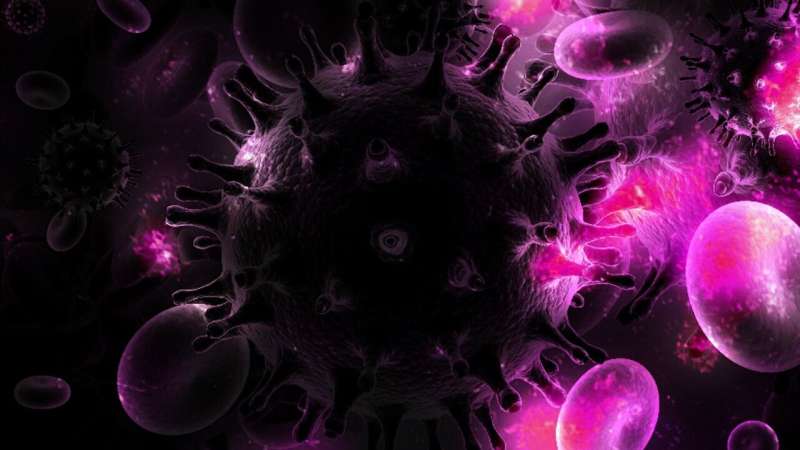This article has been reviewed according to Science X's editorial process and policies. Editors have highlighted the following attributes while ensuring the content's credibility:
fact-checked
peer-reviewed publication
trusted source
proofread
Clinical trial begins using CAR T cells to potentially cure HIV

UC Davis Health researchers have dosed the second participant in their clinical trial looking to identify a potential cure for HIV utilizing CAR T-cell therapy. The novel study uses immunotherapy. It involves taking a patient's own white blood cells, called T-cells, and modifying them so they can identify and target HIV cells to control the virus without medication.
The first participant was dosed with anti-HIV duoCAR T cells at UC Davis Medical Center in mid-August. The trial is the first-in-human clinical study investigating the duoCAR T-cell therapy for the treatment of HIV.
"We have reached an important milestone with the dosing of the second participant in our clinical trial evaluating a potentially groundbreaking CAR T-cell therapy to cure HIV," said Mehrdad Abedi, professor of internal medicine, hematology and oncology and co-investigator of the study. "So far, there have been no adverse events observed that were related to the treatment and the two participants are doing fine."
Clinical trial design
For the study, three cohorts of three individuals each (nine total) will be enrolled in the dose-escalating trial. An additional nine subjects may enroll in the expansion cohort. A total of 18 may be studied.
The study is an open-label trial, a type of clinical trial in which information is not withheld from trial participants—both the researchers and participants know which treatment is being administered.
Each cohort will receive different treatment and dosing:
- Cohort 1: A single dose of 3 x 105 cells/kg LVgp120duoCAR T cells will be infused and antiretroviral therapy (ART) will be stopped immediately after infusion.
- Cohort 2: Participants will undergo non-ablative conditioning with cyclophosphamide. A single dose of 3 x 105 cells/kg LVgp120duoCAR T cells will be infused and ART will be stopped immediately after infusion.
- Cohort 3: Participants will undergo non-ablative conditioning with cyclophosphamide. A single dose of 1 x 106 cells/kg LVgp120duoCAR T cells will be infused into the participants and ART will be stopped immediately after infusion.
Dose escalation decisions will be made when a minimum of three participants have completed the safety-evaluation period (45 days) at a given dose level and participants who have dose-limiting adverse events will reinstate ART therapy at first available opportunity.
"Our primary goal for this phase of the trial is to evaluate the safety and tolerability of varying single dose regimens of the CAR T-cell therapy," Abedi explained.
Pre-clinical research investigating the CAR T-cell therapy demonstrated an ability to potently suppress HIV and eliminate HIV-expressing cells in vitro and in animal models.
Successful treatment of cancer and lupus with CAR-T cells
Currently, CAR T-cell therapies are approved by the US Food and Drug Administration (FDA) to treat some kinds of lymphomas and leukemias, as well as multiple myeloma. CAR T-cell therapy is typically used after other types of treatment have been tried.
"It's been less than a decade since the first patient received CART-cell therapy, but we have already seen the treatment has produced dramatic results for many patients," explained Steven Deeks, a professor of medicine at UC San Francisco and co-investigator of the study.
Additionally, a study published in the journal Nature Medicine, suggests CAR T-cell therapy could become a highly effective therapy for Systemic Lupus Erythematosus (SLE) patients who do not respond to current lupus treatments.
Standard lupus treatments do not entirely relieve disease symptoms for many patients because treatments do not remove all harmful B cells. In the study, researchers tested if eliminating all the harmful B cells would push difficult-to-treat SLE into remission.
"Although there is still work to be done and more to learn about CAR T-cell therapy, we are hopeful of its potential as a revolutionary new pillar in treatment of many diseases," Deeks added.
The search for an HIV cure
Currently, there are approximately 38 million people living with HIV around the world and over half of them receive antiretroviral therapy. Despite the progress made in treatment, in 2021 there were an estimated 1.5 million new cases and 650,000 people died from AIDS-related illnesses worldwide, according to UNAIDS.
"HIV remains the deadliest pandemic of our time and more effort needs to be invested in developing a potential cure for this disease," said Paolo Troia-Cancio, a clinical professor of medicine with the infectious disease division and co-investigator on the CAR T-cell study. "If we are able to identify the optimal dose of the CAR T-cell therapy for ongoing clinical development, we may be one step closer to finding that cure."
For the study, researchers are recruiting HIV-positive patients in the Sacramento and San Francisco regions over the age of 18 who have had an undetectable HIV viral load for 12 months and have been on continuous antiretroviral therapy for at least 12 months.



















